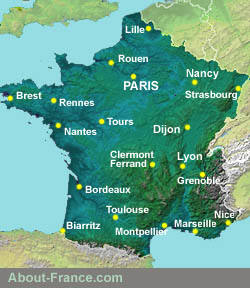French grammar
French pronouns - les pronoms 3 : y and en
Definitions
- Y and en are adverbial pronouns.
- This means that they stand in place of an adverb phrase.
- A simple adverb phrase is made up of a preposition followed by a noun.
1. Y
1.1. ► Y replaces or refers back to an adverb phrase of place or of location.In its simplest form, it means just there (in the meaning of in that place)
It can also mean in something, on something, under something, beside something, etc.
Examples:
Il y est déjà !
He's already there !
Elle est dans la maison; je l'y ai vue !.
She's in the house; I saw her there !
Je connais bien Paris; j'y habite.
I know Paris well; I live there.
Mets le sur la table; il y sera bien visible.
Put it on the table; it will be very visible there.
Le vin est dans la cave; il s'y conserve très bien.
The wine is in the cellar; it keeps very well there.
Il y est déjà !
He's already there !
Elle est dans la maison; je l'y ai vue !.
She's in the house; I saw her there !
Je connais bien Paris; j'y habite.
I know Paris well; I live there.
Mets le sur la table; il y sera bien visible.
Put it on the table; it will be very visible there.
Le vin est dans la cave; il s'y conserve très bien.
The wine is in the cellar; it keeps very well there.
1.2. ► Y replaces an adverb phrase of direction or of movement towards a designated place. It often replaces or refers back to the French preposition à
It can therefore mean to a place, towards a place, towards a goal, etc. - both litterally and figuratively.
Examples:
J'y vais tout de suite.
I'm going (there) immediately.
On y va ?
Shall we go (to somewhere) ?.
On va y arriver avec un peu de patience.
We'll get there with a bit of patience.
Je vais à Washington demain. J'y vais tous les deux mois.
I'm going to Washington tomorrow; I go there every two months.
Il pense à cela; au fait il y pense beaucoup.
He's thinking about that; indeed he's thinking about it a lot..
J'y vais tout de suite.
I'm going (there) immediately.
On y va ?
Shall we go (to somewhere) ?.
On va y arriver avec un peu de patience.
We'll get there with a bit of patience.
Je vais à Washington demain. J'y vais tous les deux mois.
I'm going to Washington tomorrow; I go there every two months.
Il pense à cela; au fait il y pense beaucoup.
He's thinking about that; indeed he's thinking about it a lot..
1.3. ► Y is very commonly found in the expression il y a (and its variations in other tenses, such as il y avait). Here it has no real meaning, but corresponds to the English There is or there are. Note that unlike there is/ there are, Il y a is only used in the singular
Examples:
Il y a deux hommes à la porte.
There are two men at the door.
Il y avait beaucoup de confusion à propos du résultat.
There was a lot of confusion about the result.
Je pense qu'il y en aura assez.
I think there will be enough of them.
Il y a deux hommes à la porte.
There are two men at the door.
Il y avait beaucoup de confusion à propos du résultat.
There was a lot of confusion about the result.
Je pense qu'il y en aura assez.
I think there will be enough of them.
1. En
2.1. ► En replaces or refers back to an adverb phrase of quantity or partIn its simplest form, it means just of it or of them.
Examples:
Ces pommes sont bonnes ; j'en ai déjà mangé trois !
These apples are good; I've already eaten three of them !
Le début du film est mauvais, mais la fin en est très bonne !.
The start of the movie is bad, but the end (of it) is very good !
Je connais le plan général, mais je n'en connais pas les détails.
I know the general plan, but I don't know the details.
L'Emir a deux Rolls-Royce, mais son fils en a trois.
The Emir has two Rolls Royces, but his son has three.
La pizza est au frigo; je t'en ai laissé la moitié.
The pizza's in the fridge; I've left you half (of it).
J'en ai vendu trois la semaine passée.
I sold three (of them) last week.
Il n'en reste plus que trois.
There are only three (of them) left.
Ces pommes sont bonnes ; j'en ai déjà mangé trois !
These apples are good; I've already eaten three of them !
Le début du film est mauvais, mais la fin en est très bonne !.
The start of the movie is bad, but the end (of it) is very good !
Je connais le plan général, mais je n'en connais pas les détails.
I know the general plan, but I don't know the details.
L'Emir a deux Rolls-Royce, mais son fils en a trois.
The Emir has two Rolls Royces, but his son has three.
La pizza est au frigo; je t'en ai laissé la moitié.
The pizza's in the fridge; I've left you half (of it).
J'en ai vendu trois la semaine passée.
I sold three (of them) last week.
Il n'en reste plus que trois.
There are only three (of them) left.
2.2. ► En replaces an adverb phrase of direction or of movement from a designated place. It often replaces or refers back to the French preposition de.
Examples:
J'en reviens.
I'm coming back (from somewhere, from an event).
Il est bien arrivé au sommet ; c'est quand il en descendait qu'il a eu mal .
He reached the summit all right; it was on the way down that he felt unwell.
J'en reviens.
I'm coming back (from somewhere, from an event).
Il est bien arrivé au sommet ; c'est quand il en descendait qu'il a eu mal .
He reached the summit all right; it was on the way down that he felt unwell.
2.3. ► En replaces or refers back to an adverb phrase using the preposition de in a figurative meaning after a verb
Examples:
Je ne parlerai pas de ça aujourd'hui... mais j'en parlerai plus tard.
I won't talk about that today, but I will talk about it later.
Je n'en sais rien.
I don't know anything about it. / I haven't a clue.
Je m'en fiche totalement.
I couldn't care less about it.
Je ne parlerai pas de ça aujourd'hui... mais j'en parlerai plus tard.
I won't talk about that today, but I will talk about it later.
Je n'en sais rien.
I don't know anything about it. / I haven't a clue.
Je m'en fiche totalement.
I couldn't care less about it.
| Return to French grammar pages : index | Full site index | Essential French words and phrases for travellers |





